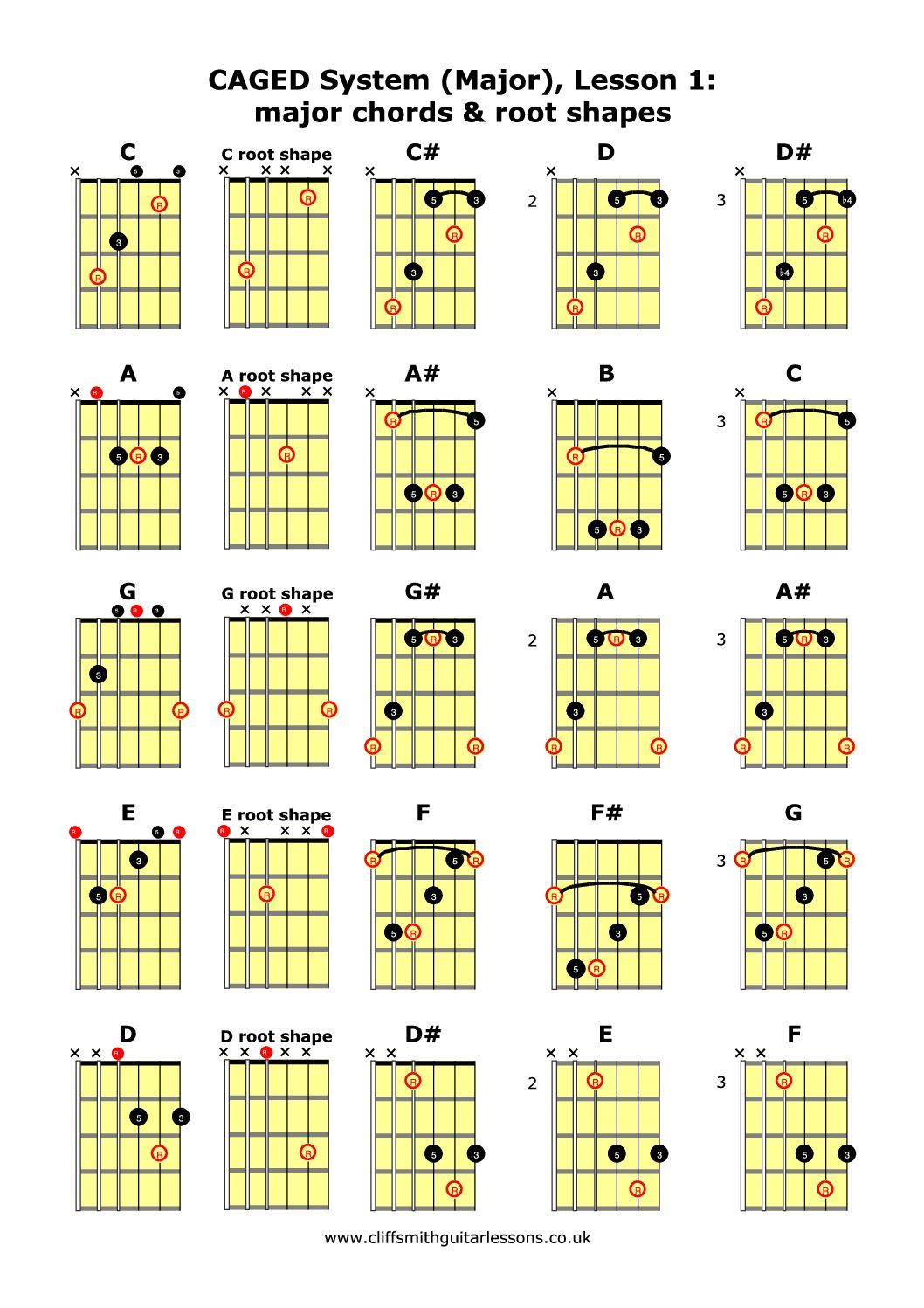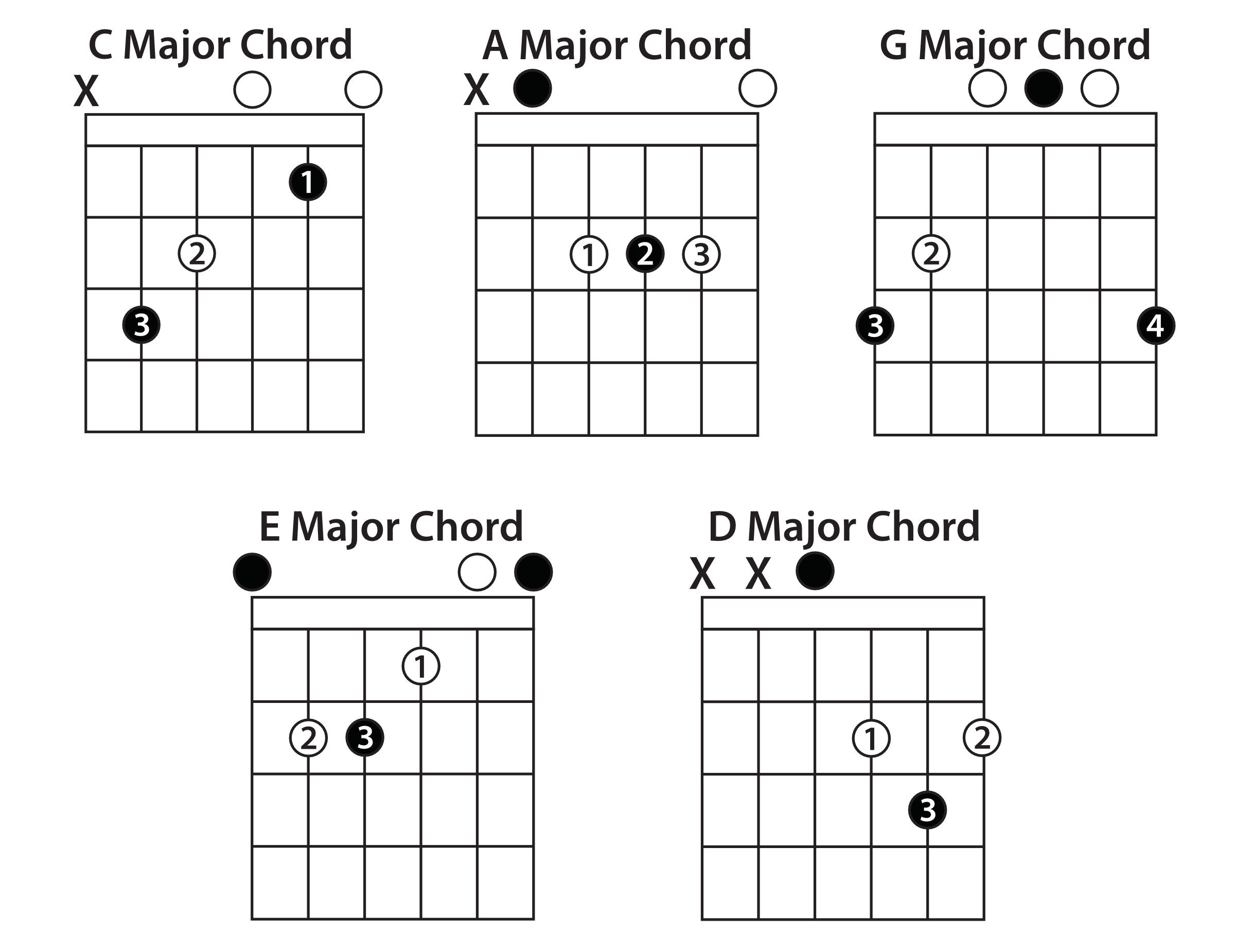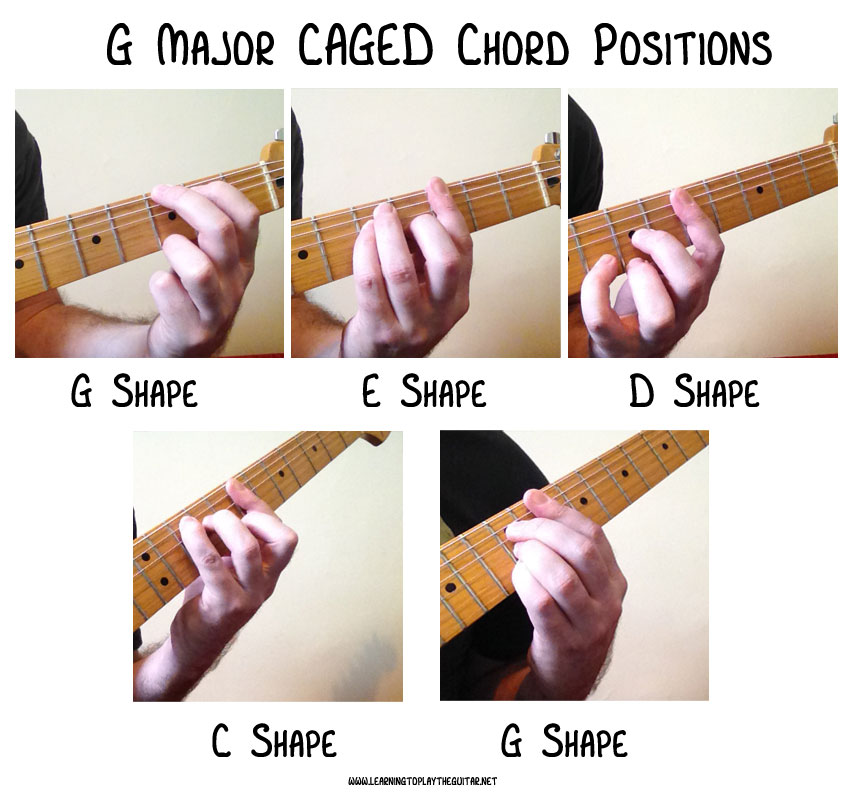
CAGED System (Major), Lesson 1 major chords & root shapes Cliff
The C-A-G-E-D System is a useful method for organizing all styles of music on the guitar. It is based on five essential guitar chord. forms found in the first position: C, A, G, E and D. The C-A-G-E-D System provides a simple way of grouping melodies with their related chord shapes. That is useful for understanding.

CAGED System Guitar Chords Guitar Music Theory by Desi Serna
Minor chords. This reggae groove passes through all five CAGED chords, this time using minor shapes and in a much more musical way. If in doubt, refer back to the five open-position chords (and their minor variants) to see how our rhythm part relates to those crucial basic shapes. Note that the shapes used are written in brackets over the music.

CAGED System for Guitar Guitar Ninja
The CAGED method takes its name from the fact that there are only five basic chord forms: C, A, G, E and D. This figure shows the 5 forms of the CAGED system in their open positions. The X means that the string is not played and the. O means that the string is played open.

Understanding The CAGED System Guitar Lesson
The Five CAGED Major Open Chord Shapes Up The Neck. To see how the CAGED chord system works, let's visualize how the chords change as you move each of the standard open chords up on the neck: The C Major Open Chord Shape. The A Major Open Chord Shape. G Major Open Chord Shape. The E Major Open Chord Shape. D Major Open Chord Shape.

The Guitarist's Guide to the CAGED System Premier Guitar
The CAGED system or CAGED sequence utilizes repeating open chord shapes that ascend (and descend) the guitar neck. This navigation method pairs well with other systems for playing up and down the fretboard and is used in both rhythm and lead guitar applications. We'll be using two different videos to break down the CAGED system.

Minor CAGED System
How the CAGED System Works. The CAGED system works by using common open chord shapes to map out the guitar neck into five distinct sections. It helps simplify the fretboard by revealing the relationship between common open chord shapes and note/interval arrangement on the guitar. Once you see this relationship, the guitar is no longer a massive.

CAGED Guitar Chords System A Chord Method Explained and Demonstrated
3. The G form chord. Here's the open G chord and subsequent G form barre chord at the 5th fret resulting with a C chord in sound. 4. The E form chord. The open E chord and 'E form' barre chord is probably the most common bar chord because it's the easiest to play. Grip this at the 8th fret to sound like a C chord. 5.

CAGED System for guitar .pdf Chord (Music) Harmony
12.3K views. The CAGED system is a guitar fretboard visualization method used to understand chord shapes and scales across the neck. It uses five basic open chord shapes (C, A, G, E, D) which can be moved and adapted up and down the fretboard. It allows you to play chords and scales in different positions with the same familiar shapes.

CAGED Chord System Guitar Lessons by Tom Catuosco
Bar Chords. The next step for getting a grasp of the CAGED sequence is understanding that all these open chord shapes are moveable. A great example of this, is the two standard bar chord shapes that you probably already know. These are the 6th string root note E major bar chord shape and the 5th string root note A major bar chord shape.
🎸 CAGED system for guitar play chords across the entire fretboard.
The CAGED system is a method for guitar players to learn the fretboard and visualize chord shapes and scale patterns. The name comes from the five basic open-position chord shapes used to play any major or minor key: C, A, G, E, and D. The CAGED system is a valuable tool for both beginner and advanced guitarists since you can use it to: Play.

The Guitarist's Guide to the CAGED System Premier Guitar
CAGED. With the guitar CAGED chord system, you barre each of the five open forms and move around the neck playing different chords in other positions, but that's only the beginning… You see, the CAGED system doesn't end with making barre chords. Each chord form has a related arpeggio pattern. The notes from each arpeggio pattern are used.

Caged Chords Chart The Power of Music
CAGED Lesson Fig. 1. Next, you need to know where the root—a chord's musical foundation—is located in each of the five shapes. The root of a C chord, for example, is C. Major chords, which we'll focus on first, are built by stacking the root, third, and fifth notes of their respective major scales. The notes of the C major scale are C-D.

Unlocking the CAGED Chord System Learning To Play The Guitar
The CAGED chord system is based on the five open chords. For example, pressing the E open chord shape and moving your hand up the guitar's neck will let you play different chords using the same shape. If this sounds familiar, there's a good reason: barre chords and power chords both use the CAGED principle and are the most common.

The CAGED Guitar Theory System
The CAGED system is based on five chords—C, A, G, E, and D—and provides a way to organize a guitar's neck into five different sections, which can be linked together to play melodies, major scales, and arpeggios across the entire fretboard. The shapes of those chords can also be used anywhere on the fretboard to play any major chord in any.

The CAGED Guitar Theory System
The CAGED system is an easy and practical way to learn to play chords in five formats, across the entire length of the guitar's fretboard. By using the common open chord forms of C, D, E, G, and A, which are found in the sequence of C, A, G, E, D on the fretboard, hence the name of the system.

Unlocking the CAGED Chord System Learning To Play The Guitar
How CAGED Chords Are Described The CAGED system can be confusing when you are first exposed to it as the terminology requires both the chord and chord form to be named. In the majority of cases, we describe the chord shape used as a form e.g. C form, followed by the name of the chord e.g. E Major. For example, if playing the chord E Major using.